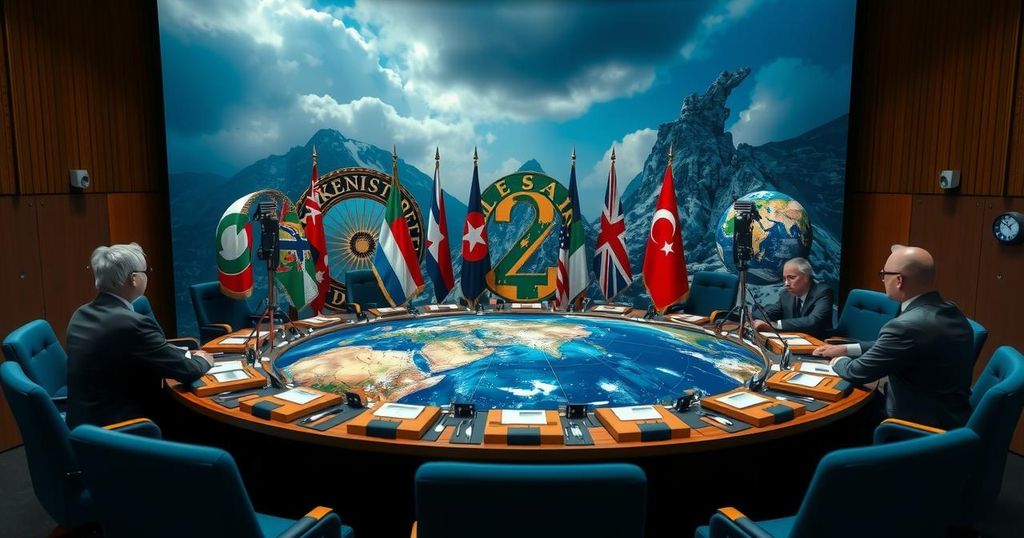G20 leaders convened in Brazil to address stalled climate talks and wars in Ukraine and the Middle East, with President Biden attending his last summit and Chinese President Xi Jinping emerging as the primary figure. President Lula of Brazil is advocating for pressing issues like hunger and billionaire taxation while navigating conflicts and calls for climate finance. Tensions remain as nations seek consensus on a summit communique amidst significant security measures.
Leaders of the G20 commenced their summit in Brazil, with the aim of reigniting stalled climate discussions while addressing geopolitical tensions relating to the Ukraine and Middle East conflicts. President Joe Biden, attending his final summit as a sitting leader, finds himself overshadowed by Chinese President Xi Jinping, who is viewed as the most prominent figure at this gathering. Brazilian President Luiz Inacio Lula da Silva has taken the opportunity to champion pressing issues such as hunger, climate change, and the taxation of billionaires. Contention remains among G20 nations over the wording of the summit’s final communique, particularly concerning the conflict-driven discussions on war and climate action. Notably, Biden’s recent authorization allowing Ukraine to utilize U.S. long-range missiles for attacks within Russia represents a significant shift in policy, likely prompting altered perspectives among European allies. Concurrently, the leaders feel compelled to revitalize the UN climate talks in Azerbaijan, which have stagnated over funding issues for developing nations. UN Secretary-General Antonio Guterres urges G20 members, responsible for 80% of global emissions, to take on a leading role in achieving a viable climate deal. In light of recent security threats, including a failed bombing that targeted Brazil’s Supreme Court, tight security measures have been implemented for the summit. President Biden’s attendance is part of a farewell diplomatic tour, which included engagements in Lima and a notable visit to the Amazon, aimed at solidifying his environmental legacy ahead of a potential Trump administration. The conference comes at a critical time when severe weather events have underscored the pressing need for collective action on climate change, with Brazil experiencing its worst wildfire season in over ten years. As the G20 leaders previously advocated for a significant increase in renewable energy by 2030, the absence of an explicit call to phase out fossil fuels remains a point of concern. Additionally, President Lula emphasized his desire to ensure that discussions regarding conflict do not overshadow essential issues such as global poverty. He remarked, “Because if not, we will not discuss other things which are more important for people that are not at war, who are poor people and invisible to the world.” As part of his agenda, Lula introduced a “Global Alliance against Hunger and Poverty,” seeking collaborative solutions to these critical challenges, while advocating for higher taxes on wealthy individuals. Resistance encountered from the Argentine delegation regarding certain agenda items may pose hurdles, although Brazilian officials express optimism regarding consensus-building. As international leaders gather to address complex global issues at this pivotal summit, the outcomes will provide significant insights into the collaborative future of G20 nations amid a backdrop of urgency surrounding climate action and socio-economic inequalities.
The G20 summit is a critical gathering of the world’s largest economies, comprising nations that together account for a significant portion of global emissions and economic activity. This summit is particularly important as it addresses not only pressing global issues such as climate change and international security but also serves as a platform for world leaders to navigate their complex relationships amidst geopolitical tensions. The backdrop of a potential Donald Trump return to the presidency adds an additional layer of complexity to the discussions, particularly concerning policies and international support for conflicts such as the Ukraine war. Climate discussions have become increasingly urgent due to rising natural disasters attributed to climate change, compelling a collective response from developed and developing nations alike.
In summary, the G20 summit in Brazil represents a crucial moment for international dialogue on pressing issues such as climate change and geopolitical conflicts. With President Biden’s significant policy shifts, the strive for consensus among nations regarding climate financing, and the spotlight on poverty alleviation initiatives led by President Lula, the outcomes of this summit will likely affect global cooperation and environmental policies moving forward. The dynamics within the G20, especially amid presidential transitions and varying national interests, will play a pivotal role in shaping future global action against urgent challenges.
Original Source: www.fox28spokane.com






